Fall 2021 Graduates
Master of Engineering in Advanced Systems Engineering
Rachel A McGrath – Pratt & Whitney
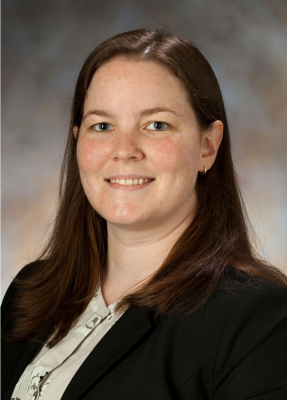
Recent Master of Engineering in Advanced Systems Engineering graduate, Rachel McGrath, is a Principal Systems Engineer at Pratt & Whitney. She received her BSE in Mechanical Engineering from Loyola University Maryland and spent the following years working in aerospace manufacturing, design, analysis, and project management.
There was always a plan to eventually go to graduate school, but she wanted to gain experience before choosing a field of study. Mechanical Engineering felt like the natural progression from her BSE, but after seeking advice from mentors and faculty members at UConn’s Institute for Advanced Systems Engineering, she realized Systems Engineering would best support her career goals.
When asked why she chose UConn for her graduate degree, Rachel replied, “The UConn MEng in ASE has an esteemed reputation at Pratt & Whitney as a rigorous and thoughtfully curated program which made it the clear choice.” Pratt & Whitney’s Employee Scholar Program supported her desire to further her education.
Another aspect that attracted Rachel to UConn’s Systems Engineering program was how applicable the course content and skills were in solving real-world, industry-oriented problems. Rachel’s wide range of experience in product development spanning concept, preliminary and detailed design, production, repair, and retirement lent itself well to course topics on product lifecycles and understanding the impacts of system architecture on emergent behavior. She used course projects to develop physical system models and optimize component designs using representative examples of real problems encountered at work.
With a project-based learning approach, she developed practical systems engineering skills that translated quickly to her daily work. Some of the most important skills she learned were industry-standard Model-Based Systems Engineering tools, methods, and frameworks. Since graduating, Rachel moved to a role in Pratt & Whitney’s Engine Design & Systems Integration department and has become an OMG Certified Systems Modeling Professional and an INCOSE Systems Engineering Professional thanks to the knowledge and skills she gained in the UConn Advanced Systems Engineering program.
“My career trajectory has changed for the better thanks to the skills I learned in the UConn Systems Engineering program. The program formalized concepts I had picked up throughout my career and gave me the language and tools to communicate effectively. Having a female academic and capstone advisor was a wonderful experience. It certainly helped to have a role model to look up to when I tried picturing myself as a systems engineer. For my capstone, I chose to do a project with two undergraduate senior design groups sponsored by a startup company. It was a unique opportunity to practice my project management skills while working as a lead systems integrator. I also appreciated the chance to work on a system outside of my day job. It helped me think about things differently, and I was able to translate some of the perspectives and techniques I used on my capstone directly into work projects.”
Spring 2021 Graduates
Master of Engineering in Advanced Systems Engineering
Alec Schmidt – New Hire at Pratt & Whitney
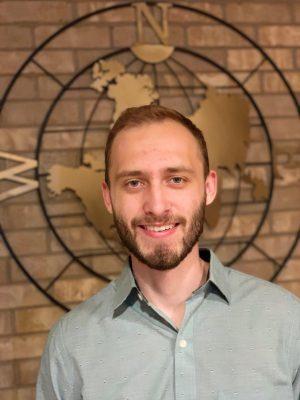
After finishing his undergraduate degree at UConn during the height of COVID-19 pandemic, Alec Schmidt decided to further his formal education and pursue a Master’s of Engineering in Advanced Systems Engineering at UConn. He wanted to set himself apart in the job market and explore solving engineering problems from a broader perspective, leading him towards studying Systems Engineering. “Rather than designing one component in a large system I can instead be involved with designing how the entire system integrates and operates,” says Alec. As a recipient of UConn’s Springboard Graduate Scholarship, he was able to pursue his Master’s degree directly after earning his undergraduate degree, with a significant discount due to this special program to support graduating UConn engineering students during the pandemic.
Through his courses, Alec was able to familiarize himself with technical skills, modelling, and software that assist him in designing optimal systems. He enjoyed the combination of technical and non-technical courses he was able to take that gave him a foundation of the principles of systems engineering and also learned powerful problem-solving techniques. “Everything I’ve learned in the ASE program will be the foundation of my future work. Throughout my career I will continue to develop new skills, but what I learned in the ASE program will provide the foundation for them.”
He also appreciated the communication he was able to have with his professors in his courses. Online one-on-one meetings with professors and prompt, helpful email responses were valuable in his learning experience.
In his Capstone project, “The Modeling and Control of a Wastewater Treatment Plant,” Alec developed a model of a temperature control system to be used in a wastewater treatment plant. Through this project, he was able to gain experience with the SysML descriptive systems language and the Modelica acausal, equation oriented systems modeling language. Additionally, he was able to study the integration of model-based systems engineering and physical modeling, which gives engineers the ability to design and test complex systems during early phase development.
Earning his Master’s of Engineering in Advanced Systems Engineering, Alec is hoping to obtain a systems-focused new position, and create a strong foundation for his career after graduation. “I would highly recommend UConn’s Advanced Systems Engineering programs and courses to anyone seeking to branch out to something different from their undergraduate degree. It provides a unique set of skills that will set you apart and make you desirable to employers.”
Master of Engineering in Advanced Systems Engineering
Evan Courtney – Emprise Corporation
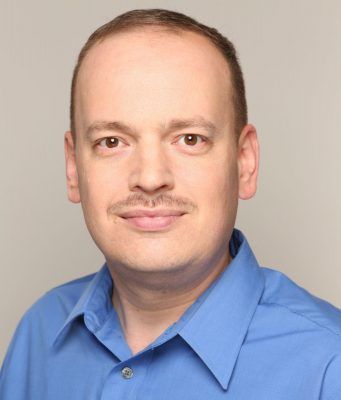
In his current position as an Engineer at the Emprise Corporation, Evan Courtney manages maintenance and plans for the Navy’s Military Sealift Command. He decided to pursue a Master’s of Engineering in Systems Engineering at IASE to advance his career and acquire new skills that he could apply to the complex systems and data he deals with in his position.
Evan felt that UConn’s program was the right fit for him because it was designed with working professionals and their schedules in mind. The flexibility afforded to him through the asynchronous learning environment allowed him to incorporate lectures and course work into his schedule. At the same time, he was able to interact with and learn from his classmates through the virtual classroom. He also appreciated the full semester, non-compressed courses that allowed him to fully understand the material taught in each course.
Another positive aspect of Evan’s experience was the project-based learning of the program. “The opportunity to learn-by-doing under the supervision of an expert in the field is what makes a formal, full semester course work the standard from which all other academic efforts are measured,” says Evan. He was able to refresh his programming and linear algebra skills, and further develop his writing skills.
Through his coursework, Evan was able to complete a Capstone project where he developed an unsupervised learning algorithm that can sort engine pressure-crank angle traces according to how well the engine is running and characterize the way that an engine’s condition degrades over time. In the future, Evan’s company’s customer plans to implement model-based maintenance planning, which would involve analyzing decades worth of data to predict the mission capabilities of their ships and calculating the value of future repairs for the ships. The algorithm created through his Capstone project was applicable to his work with collecting and analyzing ships’ condition data. “The education I received is directly applicable to the medium/long-term goals of my employer, as well as general interest to myself,” says Evan. “The MENG degree I received is a check-box on a career path to greater responsibility and pay.”
Graduate Certificate in Advanced Systems Engineering
John Gangloff, Ph.D. – Raytheon Technologies Corporation

“I wanted to further my education to branch out from my traditional physical sciences and engineering background into the rapidly evolving space of digital technologies and advanced cyber-physical systems. I wanted to be able to contribute to a diversity of industrial focus areas, so that I could apply my core backgrounds in mechanical engineering, materials, and manufacturing to a multitude of applications. In some sense, I looked at my investment into more education as a hedge against technological disruption.
I was attracted to UConn for its strong relationship with my company, Raytheon Technologies Corporation – which was formed last year with the merger of United Technologies’ aerospace businesses and Raytheon Company. My company has an “Employee Scholars Program” or ESP, where employees are strongly encouraged and supported to further their education to unlock new technologies and value for our customers. I really wanted to participate in the ESP in some way and the program that UConn offered was a great fit for me.
I felt the subject matter of advanced systems engineering really resonated with me and I saw direct relevance of it to the biggest technology problems we face today, including aerospace, defense, materials, manufacturing, and energy. I felt like advanced systems engineering provided a new viewpoint, methodology, and language to look at old and new technical problems for optimum performance and value. I also wanted to learn how to better communicate with technical and non-technical people, especially those outside of my discipline. Advanced systems engineering provides a framework to analyze industrial systems in a way that is relevant to technical and business interests.
The content is very relevant and applicable to the state-of-the-art today. The courses were structured to provide ample opportunity to practice “learning-by-doing”, which one would initially envision is very challenging to implement from an online format. The courses’ practice and project-based approach allowed me to implement the skills I was learning on industry-relevant problems as they were presented, which allowed me to understand their value and applicability in practice.
The collaboration tools we used during the courses were very good at bridging physical divides and providing mechanisms to interact with professors and peer-to-peer. I also really appreciated that the program experience ended up being an implicit training for the emerging work-from-home / hybrid-work model of the future. My interactions with professors and peers via our hybrid distance learning tools gave me the confidence that we can work together and get good work done, even if physical barriers exist.
The program gave me knowledge in key technical areas that my core background did not cover but are very relevant to my field today. For example, before this program, I did not fully understand Artificial Intelligence/Machine Learning and how it could be applied to my technical area of interest. Now I have a working knowledge of this field and I understand how it can be applied to unlock value. Although ample free resources are available online on this content, I did not know where to start or what to look for on my own. After taking my courses, I now know what to search and have a core knowledgebase to build upon.
I have been able to apply what I have been learning to my work either directly with new skills and approaches or with new ideas for new projects. I believe the certificate will help me unlock future career paths and collaboration opportunities within and outside of my core technical communities. I also feel like I can revisit my past body of work and apply the lessons of my certificate to unlock new value.
I really enjoyed the experience. Especially as the COVID-19 pandemic took over our world. Having this program was an excellent way to stay focused and grow during such a challenging time. I also feel more motivated at work, given new technical insights as well as new methods to communicate complex systems information in ways that capture the complexity in a more formal and easier to understand format.”
Spring 2020 Graduates
Graduate Certificate in Advanced Systems Engineering
Robert Leffler – Carrier
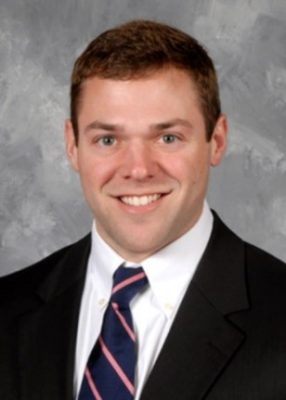
As a Principle Robust Design Engineer in the Computational Science and Engineering Group at Carrier, Robert Leffler decided to pursue a Graduate Certificate in Advanced Systems Engineering at UConn because of the need for a Systems Engineering skillset in his projects at work. He wanted to build upon his mechanical engineering background, and the increasing relevance of Systems Engineering in his work encouraged him to pursue formal education in Advanced Systems Engineering at the there is no better way to learn than by doing,” says Robert. He also appreciated the flexibility that comes with a program that can be completed entirely remotely. This allowed him to watch lectures on his own University of Connecticut.
During his time in the program, Robert appreciated the project-based courses, with additional guidance from course materials, which allowed him to ensure he was working in the right direction. “For me, time, even while travelling. Although the courses took place online, Robert never felt as though he was missing out on a classroom experience. Through the live class sessions, he was able to fully communicate with his professors and peers, which supported his learning and led to helpful discussions and Q&As in class.
Robert felt that one of the most important parts of his coursework was a class where he learned about the workflow of systems engineering and the entire process of a systems-engineering-based project was put into perspective. Another class that Robert enjoyed from the Graduate Certificate program was about uncertainty analysis and numerical methods, and this experience piqued Robert’s interest in developing and using regression models to improve the safety and quality of systems. His interest in Systems Engineering continues to grow, and he has recently started a new Graduate Certificate program on Data Mining at another university to delve even deeper into this topic.
Throughout the Graduate Certificate program, Robert developed new skills in optimization under uncertainty and systems engineering that helped him obtain his new position where he develops model-based systems engineering tools for product development engineers. He has found that the skills and content he gained from his experience at UConn IASE align well with his career goals and the day-to-day work he currently does at Carrier. Robert says he would give this experience a “10 out of 10” and would recommend it to a friend looking to apply Advanced Systems Engineering principles in their work and to advance their career.
Master of Engineering in Advanced Systems Engineering
Stosh Olsbo – Lockheed Martin Sikorsky
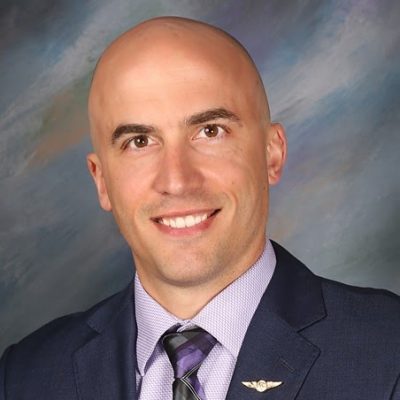
Stosh Olsbo is a recent graduate of the University of Connecticut Master’s of Engineering in Advanced Systems Engineering program. He currently works at Lockheed Martin Sikorsky and earned his degree in May 2020. He decided to pursue a graduate degree in Advanced Systems Engineering for his own personal desire and to advance his career. UConn’s academic program, developed by its United Technologies Corporation Institute for Advanced Systems Engineering (IASE), was the best option for him because of its flexibility in accepting his previously completed graduate credits from another institution. He chose to study Advanced Systems Engineering because of its applicability in his career. Pursuing Advanced Systems Engineering allowed him to look at the bigger picture of complex system design and development, but still be involved in engineering. Stosh describes Advanced Systems Engineering as an “ideal blend of management and engineering”.
The virtual format of the classes afforded Stosh a high degree of flexibility in completing his degree. He was able to access course materials at any time, and could even download these materials to access them without internet connection while he travelled. This amount of adaptability is helpful for those who are students and working professionals at the same time. He found the professors at UConn to be extremely helpful, supportive, and well-versed in online teaching methods. Additionally, the project-based curriculum allowed Stosh to see the full life-cycle of a project and all of the steps leading to its completion.
In his current position as an Aircraft Manager for helicopters at Sikorsky, Stosh is moving towards a systems engineering role for his next rotation where he will be able to apply the skills he acquired through earning his Master’s degree at UConn. Stosh currently participates in Lockheed Martin’s Engineering Leadership Development Program, ELDP Class of 2021. His degree provides him with preemptive exposure to the knowledge base he will need during this rotation so he will already be familiar with the concepts when he receives training for his position. “Grad school has been both a challenging and rewarding experience.” Stosh says. “I am VERY proud to be a Husky.”
Spring 2019 Graduates
Master of Engineering in Advanced Systems Engineering
Brian Sheehan – The Charles Stark Draper Laboratory, Inc.
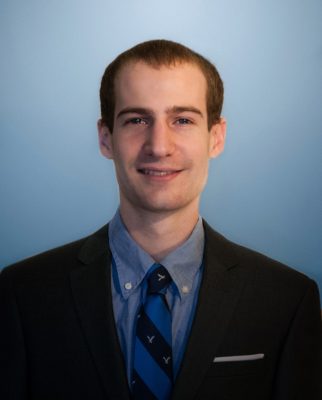 Early on in his academic career, Brian Sheehan knew that he had an interest in systems engineering. This type of degree was not one he was able to obtain as an undergraduate, so he strived to further his education in systems engineering after graduating with degrees in Mechanical Engineering and German. This decision to receive a graduate degree was one he knew would bring him many benefits in his career, and he felt it “opened doors that would’ve been otherwise closed if [he] had only held a Bachelor’s.”
Early on in his academic career, Brian Sheehan knew that he had an interest in systems engineering. This type of degree was not one he was able to obtain as an undergraduate, so he strived to further his education in systems engineering after graduating with degrees in Mechanical Engineering and German. This decision to receive a graduate degree was one he knew would bring him many benefits in his career, and he felt it “opened doors that would’ve been otherwise closed if [he] had only held a Bachelor’s.”
Brian’s passion for systems engineering and the SE program at UConn was further bolstered through the coursework he completed. The project-based curriculum gave him hands-on, practical experience while the online modules allowed for him to learn at his own pace while maintaining a full-time job. Another factor within UConn’s program that Brian felt passionate about was his professors. In regards to his busy schedule, Brian felt his professors were “flexible and understanding in the challenges.” He reiterated how “lectures, office hours, course content and projects were engaging and helped facilitate effective learning,” thus leading to his further success within the program. Throughout his time in the Master of Engineering in Advanced Systems Engineering program, Brian said he was able to harness essential skills such as systems thinking, advanced systems engineering principles and practices, effective requirements development and analysis, and advanced system modeling. Brian says these are just a few of the skills he was able to take away from his experience and use every day in his new role as Systems Engineer at Draper.
When asked about the value and outcome of studying Systems Engineering at UConn Brian said, “This degree was pivotal in allowing me to pursue the career I wanted. It also gave me a solid viewpoint of what systems engineering is and what aspects of it I enjoyed. For me, it is the process, the model, and the systems engineering data generated by executing the various systems engineering activities that interest me, rather than detailed system design.” Brian was able to harness the knowledge he gained from the program at UConn to jump-start a new Systems Engineering career.